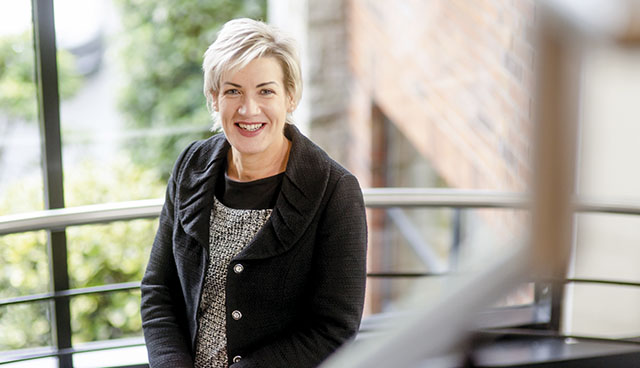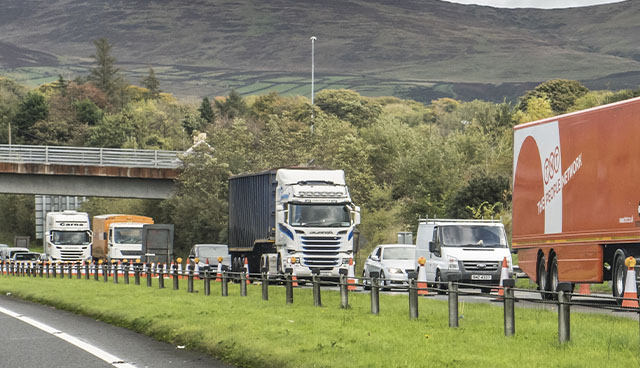From recovery to growth

New CEO of InterTradeIreland, Margaret Hearty, outlines her ambition to support more firms across the island back to growth mode and embrace new opportunities as the pandemic loosens its grip.
At the end of 2021, InterTradeIreland’s latest Business Monitor survey revealed that the number of firms trading cross-border in Ireland reporting to be stable (44 per cent) or in growth mode (41 per cent), had essentially returned to pre-pandemic levels.
The encouraging figures come as no surprise to the recently installed CEO of the cross-border trade body, following a busy few years of delivering their own programmes and signposting businesses, disrupted by the pandemic, to the relevant supports.
Hearty believes that the number of organisations either approaching or already in growth mode is an indicator that her organisation is delivering the right supports and advice, but admits that it is also a sign of the resilience of businesses in both jurisdictions.
In the first half of 2021, InterTradeIreland assisted over 2,500 companies, with demand for the business body’s supports driven by small firms seeking to help innovate and grow as they emerged from the pandemic and the end of the Brexit transition period.
Despite the disruptive impact of the pandemic, cross-border trade on the island has now reached an all-time high of €7.7 billion, which represents a huge opportunity for businesses. However, Hearty believes that the organisation has a critical role in further supporting SMEs to seize a vast array of emerging opportunities.
Although in the CEO post for just over a year, Hearty has worked in various roles across the cross-border body, set up as part of the Good Friday Agreement, since its inception.
Based in Newry, InterTradeIreland has been helping small businesses in Ireland and Northern Ireland explore new cross-border markets, develop new products, processes and services, and become investor-ready for over two decades.
To date, the organisation has supported more than 48,000 small businesses to identify and develop trade and innovation opportunities, creating an estimated 18,000 new jobs and generating some €1.3 billion in business development value.
Hearty believes her background of business development and customer-facing roles in the private sector, coupled with her extensive experience of working with entrepreneurs, small and medium sized enterprises, and start-up businesses within InterTradeIreland, has given her a great “grounding” for her current role.

“With Brexit and then the pandemic, as a trade body, our role was to provide facts and information to businesses.”
Discussing her extensive experience in designing innovative solutions and supports for business, and her passion for helping and supporting business to grow and develop, Hearty says: “Our customer is the small business on the island and our remit is helping to support those businesses to trade on an all-island basis. SMEs are the lifeblood of our economy and InterTradeIreland has a key role to play in helping businesses as they navigate these uncertain times.
“The organisation has a wide remit; from helping SMEs to identify and source new business opportunities in the cross-border market and guiding them through the new trading requirements, to assisting firms to collaborate with cross-border partners to innovate and become more competitive and increase their chance of investment.”
The CEO explains that InterTradeIreland’s approach of listening to organisations to develop and deliver services is supported by constant monitoring of outcomes for businesses, enabling flexibility in how they support businesses to continue to export and grow. Pointing to the example of the Acumen programme, a support aimed at enhancing the capacity and capability of SMEs to take the first formal steps onto the export ladder and based on evidence that exporting businesses have proven to be more innovative, productive, and resilient, Hearty highlights that the average return for a £15,000 grant is estimated to be in the region of £250,000 per company.
One of InterTradeIreland’s main objectives is to increase economic cooperation across the island of Ireland by facilitating and encouraging mutually beneficial cross-border relationships. It is at the core of everything it does as an organisation, from its cross-border cluster initiative Synergy to its Innovation Boost (formerly known as Fusion) programme, which links companies in one jurisdiction with ideas for new product development with academic institutions in the other.
“Everything we do is about sharing knowledge, best practice, and information across the island. Our Funding for Growth research which looked at business angel activity led to the establishment of the Halo Business Angel Network as an all-island umbrella group,” says Hearty. “We also assist with wider all-island or cross-border cooperation, for example, by supporting academics and businesses to partner across the island to access Horizon funding.”
Brexit
Pre-dating the disruptive impact of the pandemic, InterTradeIreland’s important role in supporting organisations to trade cross-border has been critical to companies trying to navigate the complexities of Brexit. Recognising the very different environment for businesses that would occur as a result of the Brexit referendum, Hearty explains that InterTradeIreland has played a critical role in helping businesses navigate uncertainty.
“Since 2016, uncertainty, to a certain degree, has become the new norm,” she says. “With Brexit and then the pandemic, as a trade body, our role was to provide facts and information to businesses. It is what we have done for the past four years and something we continue to do.”
In 2016, InterTradeIreland set up its dedicated Brexit Advisory Service, providing essential post-Brexit information for cross-border SMEs and offering a Brexit Voucher support, providing up to €2,250 towards professional advice to help businesses identify their Brexit exposure and to plan. The CEO explains that the value and success of the programme has been such that InterTradeIreland is currently transitioning it into a new Trade Information Service.
Explaining the necessity of continuing support, Hearty says: “A lot of uncertainty remains around the Northern Ireland Protocol, which has allowed for the free movement of goods across the island, but omits services, which is an important component of cross-border trade.
“ Many businesses that trade cross-border have complex supply chains which extend beyond the island into Great Britain and Europe and so, we have installed an agility into our supports over the past 12 months.”
“We continue to support businesses by giving them factual information and by helping them identify where the potential risks are. Many businesses that trade cross-border have complex supply chains which extend beyond the island into Great Britain and Europe and so, we have installed an agility into our supports over the past 12 months, ensuring that we are constantly adapting and responding to any new changes in the environment and the needs of businesses.”
Corporate plan
The CEO explains that agility will be required as the organisation looks to outline its forward-looking framework for the coming years. 2022 is the last year of InterTradeIreland’s current corporate plan and the organisation is in the process of developing a new strategy, reflecting the priorities of both governments and the sponsoring departments of the Department for the Economy (DfE) in the North and the Department of Enterprise, Trade and Employment (DETE) in the South.
Due to be published next year, Hearty sets out that as well as seeking to address the short-term challenges facing businesses, the corporate plan will have a focus on the low-carbon and green agendas, a priority for government in both jurisdictions.
However, she stresses that InterTradeIreland is already engaged in encouraging companies across the island to deliver low-carbon solutions on a cross border basis. At the end of 2021, InterTradeIreland’s Seedcorn Investor Readiness Competition, the largest investor readiness competition aimed at new-start and early-stage companies in any sector across the island, now in its 19th year, launched a new Low Carbon award, recognising start-ups innovating within the low carbon and green sector.
Explaining the prioritisation of sustainability-focused development of new products and services in InterTradeIreland’s innovation supports, Hearty explains that supporting best practice on an all-island basis, in terms of what businesses can do to become more sustainable, is a basis for the organisation’s Knowledge Transfer programme.
“As areas identified as possessing large growth potential, InterTradeIreland has a role in signposting businesses to these opportunities.”
“There are new opportunities for businesses to be innovative and creative in these areas. As areas identified as possessing large growth potential, InterTradeIreland has a role in signposting businesses to these opportunities. Additionally, we know that grasping the opportunity of megatrends is more difficult for micro-businesses who are time poor, and so we are working to bring that knowledge to those smaller businesses and helping them stay ahead of the curve.”
Hearty believes that in developing responses to the pandemic, InterTradeIreland has adopted learnings that will help them support businesses for challenges of the future. Specifically addressing the need for businesses to embrace the opportunities of the fourth industrial revolution, Hearty highlights the success of InterTradeIreland’s E-Merge programme, established to help small businesses improve their online presence and which has supported over 1,000 companies across the island. The programme provides up to €2,800 of fully funded consultancy support to help businesses develop online sales and e-commerce solutions.
Delivered in response to Covid-19, the programme is now being mainstreamed to continue supporting SMEs to develop their e-commerce and online knowledge and encourage them to think more strategically about their cross-border sales.
“Initially set up as a response to Covid-19, the programme is now seeing a strong response from firms who are moving into the recovery phase and want to capture consumer’s attention online,” she explains.

Research suggests that cross-border trade in Ireland has the potential to grow significantly in coming years and InterTradeIreland is about to publish research identifying growth sectors, enabling InterTradeIreland to direct support to companies to take advantage of those trends. Hearty believes that embracing emerging trends could enable an unprecedented increase in future levels of cross-border trade.
One such example is the Belfast/Dublin Fintech Corridor, a cross-border strategic partnership which InterTradeIreland has supported to help boost economic growth and co-operation.
“Cross-border trade has been growing year on year over the past two decades, but we have seen a very significant doubling of growth from 2016 onwards. For small businesses, cross-border trade and export is a natural first-time export market but is also a really effective first-time export market because we know that three quarters of firms that export off island took their first step into exporting in the cross-border market,” explains Hearty.
“It is critically important that in the global context of trade, be that Brexit or Covid and where supply chain volatility is being highlighted, that small businesses here in Ireland embrace the opportunity to bridge those supply chain gaps.”
Turning to her vision for the future, Hearty believes that the surface of what is possible has only been scratched in relation to increased trade and economic co-operation as a whole.
“If you look at the priorities and the challenges that both governments have in their respective jurisdictions, it makes sense to co-operate and collaborate where economically viable. In addressing the challenges of adopting a low-carbon economy in both jurisdictions and supporting businesses to take advantage of the growth in cross-border trade, I believe InterTradeIreland can play a critical role as a customer-centred organisation, in connecting those SMEs to opportunities on an all-island basis.
“That potential collaboration can enable off-island growth opportunities as well. We are currently supporting companies to innovate and bring their skillsets together to develop new products with global potential.
“The future for InterTradeIreland lies in helping address the challenges and policy priorities of both jurisdictions, sharing knowledge and best practice and enabling both parts of the island to flourish in the new world that we are evolving into.”
Margaret Hearty is Chief Executive Officer of InterTradeIreland and acts as the organisation’s Accounting Officer. She has worked with the organisation since its inception in a number of key roles and has over 20 years’ experience working with entrepreneurs, small and medium sized enterprises and start-up businesses. Margaret is a business and marketing graduate and has an MBA.






